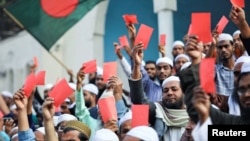In the weeks and months before Bangladesh’s parliamentary elections on January 7, the United States repeatedly called for free and fair elections, conducted without violence.
Unfortunately, the elections that kept the ruling Awami League party in power and returned Prime Minister Sheik Hasina for a fifth term “were not free or fair,” as State Department Spokesperson Matthew Miller said in a statement, declaring the United States “shares the view with other observers.”
Spokesperson Miller wrote that while the United States “notes the Awami League party won a majority of seats,” the elections were marred by violence and by the fact that “not all parties participated.”
The United States, said Mr. Miller, “condemns the violence that took place during elections and in the months leading up to it.” According to a statement by UN High Commissioner for Human Rights Volker Türk, that violence included arson attacks allegedly committed by opposition parties. Mr. Türk also pointed to the repression that took place by government authorities in the run-up to the elections, when “thousands of opposition supporters [were] detained arbitrarily or subjected to intimidation.”
“The United States remains concerned by the arrests of thousands of political opposition members and by reports of irregularities on elections day,” Spokesperson Miller said. “We encourage the Government of Bangladesh to credibly investigate reports of violence and to hold perpetrators accountable. We also urge all political parties to reject violence.”
The United States, declared Spokesperson Miller, “supports the people of Bangladesh and their aspirations for democracy, freedom of peaceful assembly, and freedom of expression. ... Looking ahead, the United States remains committed to partnering with Bangladesh to advance our shared vision for a free and open Indo-Pacific, to supporting human rights and civil society in Bangladesh, and to deepening our people-to-people and economic ties.”














